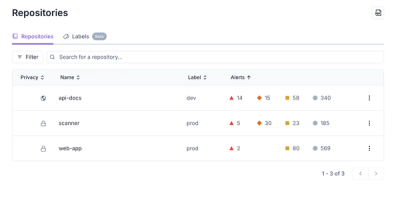
Product
Redesigned Repositories Page: A Faster Way to Prioritize Security Risk
Our redesigned Repositories page adds alert severity, filtering, and tabs for faster triage and clearer insights across all your projects.
Maps the values yielded by an async iterator
Convert one value from an (async)iterator into another.
import map from 'it-map'
// This can also be an iterator, generator, etc
const values = [0, 1, 2, 3, 4]
const result = map(values, (val, index) => val++)
console.info(result) // [1, 2, 3, 4, 5]
Async sources and transforms must be awaited:
import map from 'it-map'
const values = async function * () {
yield * [0, 1, 2, 3, 4]
}
const result = await map(values(), async (val, index) => val++)
console.info(result) // [1, 2, 3, 4, 5]
$ npm i it-map
<script> tagLoading this module through a script tag will make its exports available as ItMap in the global namespace.
<script src="https://unpkg.com/it-map/dist/index.min.js"></script>
Licensed under either of
Unless you explicitly state otherwise, any contribution intentionally submitted for inclusion in the work by you, as defined in the Apache-2.0 license, shall be dual licensed as above, without any additional terms or conditions.
FAQs
Maps the values yielded by an async iterator
The npm package it-map receives a total of 85,689 weekly downloads. As such, it-map popularity was classified as popular.
We found that it-map demonstrated a healthy version release cadence and project activity because the last version was released less than a year ago. It has 1 open source maintainer collaborating on the project.
Did you know?

Socket for GitHub automatically highlights issues in each pull request and monitors the health of all your open source dependencies. Discover the contents of your packages and block harmful activity before you install or update your dependencies.

Product
Our redesigned Repositories page adds alert severity, filtering, and tabs for faster triage and clearer insights across all your projects.

Security News
Slopsquatting is a new supply chain threat where AI-assisted code generators recommend hallucinated packages that attackers register and weaponize.

Security News
Multiple deserialization flaws in PyTorch Lightning could allow remote code execution when loading untrusted model files, affecting versions up to 2.4.0.